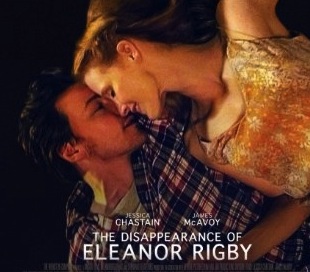The film criticism will likely continue to keep a slower pace over the next few months, but I’ll still be doing it.
The Birmingham 8, formerly my distant arthouse/indie film destination, is now a local destination of choice. And so I made another visit there yesterday to catch The Disappearance of Eleanor Rigby: Them, the first installment of a trilogy of films telling the same story.
Having known about the “bigger picture” of the other films, I question the necessity of this one, subtitled Them, after seeing it. The story gets a detailed outline in this two hour version, but there are multiple instances where it feels like something is missing, or it’s an awkward switch from one perspective to another. I can’t completely tell if the decision to truncate the longer versions was solely a commercial decision, though I’m glad to know that the full version will still be coming to theaters in October, and hope that it will appear locally – perhaps again at the Birmingham 8.
 Jessica Chastain and James McAvoy give passionate performances as the central couple, subtly shading their characterizations as the story jumps around in time, showing both their initial attraction and later distancing after an (unseen) traumatic event. As the title character, Chastain particularly impresses with her initial free-spiritedness changing to a trauma-induced restraint and (seeming) coldness, until she (as the character) begins to let the changes settle in and re-focus her life. McAvoy does the opposite challenge, both in reacting to Chastain’s changes and conveying his own redirected journey.
Jessica Chastain and James McAvoy give passionate performances as the central couple, subtly shading their characterizations as the story jumps around in time, showing both their initial attraction and later distancing after an (unseen) traumatic event. As the title character, Chastain particularly impresses with her initial free-spiritedness changing to a trauma-induced restraint and (seeming) coldness, until she (as the character) begins to let the changes settle in and re-focus her life. McAvoy does the opposite challenge, both in reacting to Chastain’s changes and conveying his own redirected journey.
The central pair is supported by a handful of supporting characters, and the film feels like it could be an intimate stage play at times with that narrow yet compelling focus. And I suspect that the full version (subtitled Him and Her) may feel like a reverse-persepctive novel brought to film.
Viola Davis, who previously appeared onscreen with Chastain in The Help, stands out in the supporting cast. (Why is Davis not top lining a film???) She delivers several initial tart lines with relish, and easily conveys a seasoned (yet weary) point of view as a college professor interacting with Eleanor and trying to get her back on her feet. Isabelle Huppert appears in a rare English – speaking role as Eleanor’s French mother, who seemed to always have a glass of wine in her hand. Oddly, the full view of the character is only expressed in scenes when she is not with Eleanor, but I suspect that is a writing trick to show what family members do and don’t say to their other relatives. Similarly, William Hurt conveys restraint as Eleanor’s father, but isn’t given a chance to show his full feelings until the very end of the film.
Additional supporting roles are filled by Jess Weixler, Ciaran Hinds, Nina Arlanda and Bill Hader. I’m sure that the full film gives more shadings to each of those roles, although Weixler and Hader do get a few notable scenes in the abbreviated take, and Hader also shows a surprising ease with the drama, given his status as a better – known comedy actor.
It is unfortunate that economics seemingly dictated the release of this abbreviated version of the story, but I’m relieved to know that the full film will still appear, where it received an apparently appreciative festival response and would certainly stand out as a novel take on how to tell a cinematic story.